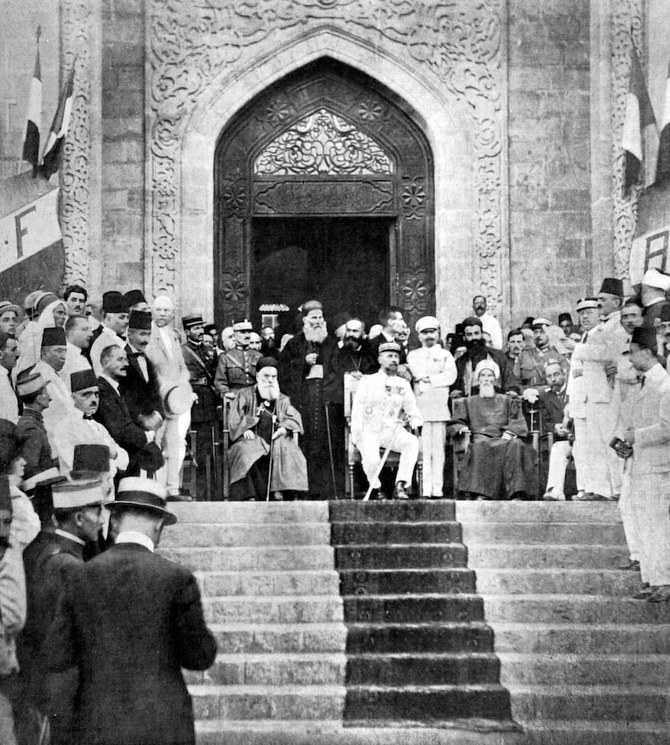NEW YORK CITY: It was amidst the ruins of the Aug. 4 Beirut port explosion, surrounded by traumatized citizens who seemed comforted by his presence, that French President Emmanuel Macron found himself in the surreal position of having to announce that he would return on Sept. 1 to commemorate the creation of Greater Lebanon.
Macron’s interaction with regular Lebanese on that day has invited re-examination of the past hundred years, during which France, despite all misgivings, was always called “the tender mother”. What separates the events that led to the creation of the modern Lebanese state and those that had brought the French leader to Beirut, is much more than just the passage of 100 years.
As his ship crossed the Atlantic on its way to Paris in 1919, US President Woodrow Wilson was armed by an unwavering vision for a new world order in the aftermath of the First World War: Affairs between nations would be conducted in the open, on the basis of sovereignty, self-determination and the repudiation of military force to settle dispute.
The victorious Allies gathered at the Paris Peace Conference to set the terms for the defeated Central Powers. A question was on everyone’s mind: What to do with the pieces left of the Ottoman Empire, the “sick man,” and every other empire that collapsed?
Back then, in the US, there was heavy opposition to colonialism. The US would never join the fight to help maintain and expand European empires. Instead, there would be mandates given to small, well-run countries, perhaps Scandinavian countries, Wilson thought, that would not have the ambition or resources to turn the protectorates into colonies. It would just give the newborn states good advice.
“But of course, as soon as Wilson got to Paris, there was no way the prime ministers of France or Britain were going to let him do that,” said historian Elizabeth Thompson, author of “How the West Stole Democracy from the Arabs.”
Paris and London were negotiating their own new order for the Middle East, and it could not have been more anathema to Wilson’s vision. France had invested so much in Syria and Lebanon during the previous century that it insisted on creating a “friendly” entity that would anchor the French presence in the Middle East.
The new entity had to be a safe haven for the Maronite Christian minority for whom High Commissioner Gen. Henri Gouraud, a passionate Catholic himself, felt very warmly. Christian fears were exacerbated by the sight of their Armenian counterparts dying by the roadside during the genocide perpetrated by the Turks.
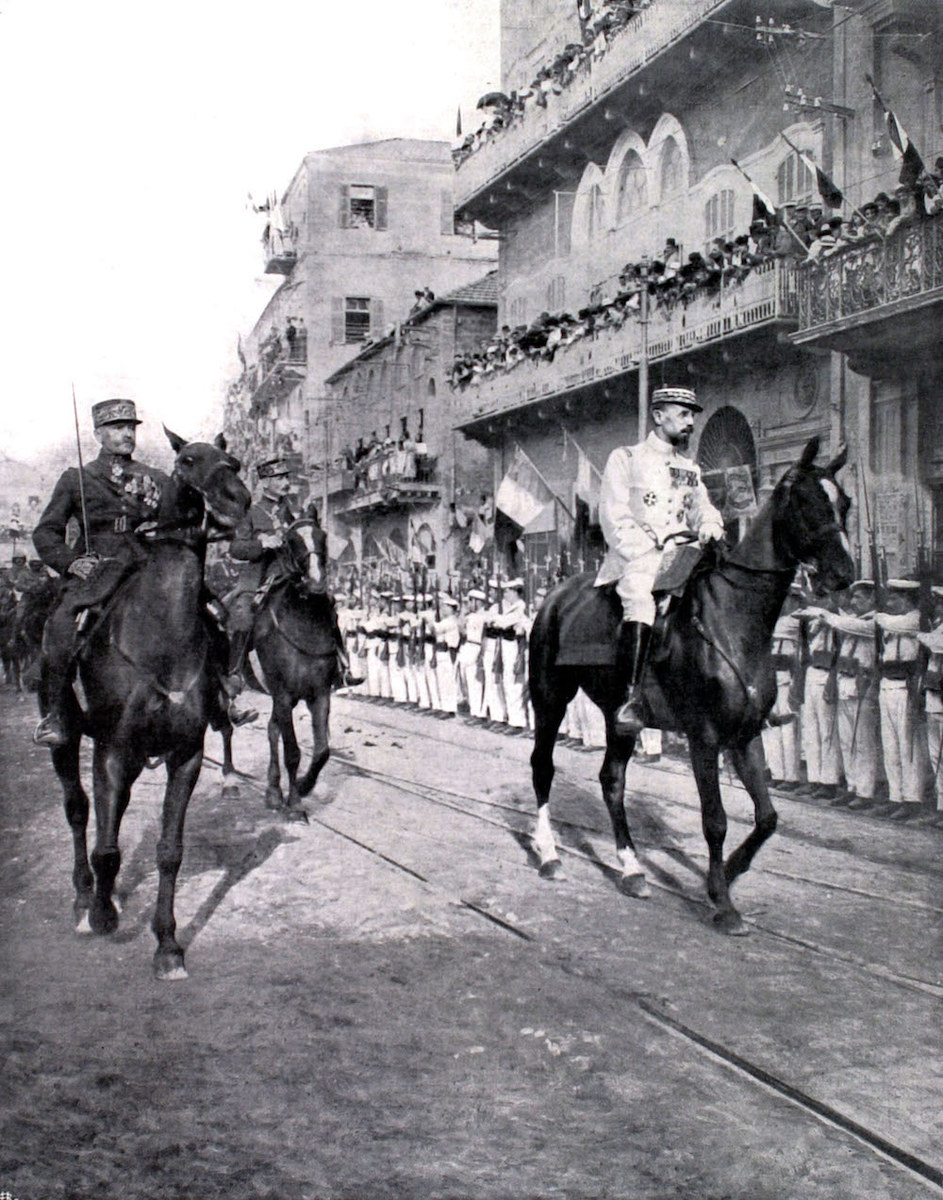
In Beirut, General Gouraud, accompanied by General Goybet, passes before a double row of infantrymen in 1920. (Alamy)
A locust wave decimated the mountain crops and resulted in famine which, compounded by the Allies’ blockade of Beirut’s coast, killed tens of thousands. Emotions, then, were running high on the first day of September 1920.
Behind the trappings of the proclamation ceremony, an important fact was kept under wraps: When the French pleaded with the British to lift the blockade off the Beirut coast, the latter refused. The blockade was to remain. Starvation was exactly the point. Deaths continued to rise.
“Macron reappeared on the explosion site to extend sympathy and promises of help, almost exactly 100 years later,” Thompson said. “Macron is to be lauded: In February 2017 he visited Algeria as he was campaigning for office, called colonialism a crime against humanity, and urged the French to apologize.
“But I have heard no mention of an apology for actions the French took in Lebanon 100 years ago, even as the League of Nations awarded them the mandate.
“When World War I ended, the French came with sacks of grain and declared themselves the saviors of the poor Lebanese. Then, they installed a sectarian regime: Access to political office and representation was defined along the lines of what religion you belong to.
“Sectarianism segments the citizenry. The direct opposite would the project of French Revolution: to create no mediating. It is kind of ironic, isn’t it, that the French came up with this system of power?
“That sectarian system laid the seeds for the deep divisions within Lebanese politics that we all now know too well have weakened the development of a stable government, which could ideally care for all Lebanese people.”
Then again, sectarian politics was thriving long before Greater Lebanon. In the preceding system, known as Mutasarifiya, sectarian institutions had already emerged in an attempt to create a balance among communities.
“What the French mandate did, however, was anchor that sectarianism, continuing a pattern that was prevalent under the Ottomans,” said Michael Young, author of “The Ghosts of Martyrs Square” and a senior editor at Carnegie Middle East Center.
“When, in 1943, the Lebanese came to an agreement on their National Pact, a lot of what the French had introduced during the mandate became custom. For example, the president is Christian, the prime minister is Sunni and the speaker of the parliament Shia.”
Lebanese poet Henri Zoghaib, who has been advocating for a secular state for years, believes “sectarianism in religion is good, for every religion has its sects. But sectarianism in the state is a disaster.
“The French Revolution began way before 1789 when the nobility and the clergy were tyrannizing society. When the revolution matured and the Bastille was stormed, the clergy were put in their place, and politicians in theirs. The people became the source of power. The people were the ‘word of God.’ Only when the same happens in Lebanon, will we be delivered from this monster called sectarianism.”
For all its faults, however, Young believes that sectarianism is naturally a pluralistic system.
“If Lebanon was Lebanon between 45 and 75, the sectarian system made that possible,” he said.
“Sectarianism made it difficult to have an absolute state suffocating society like you had in Syria.
“In Lebanon, because you had a weak state, you had a much stronger, more varied and independent society. Sectarianism was good in that it generated pluralism.”
Young makes a key distinction between sectarianism as it had been prior to the 1975 Lebanese civil war, and the version that emerged after it ended.
“When the war ended in 1990, you had a new order established by the Syrians and the Saudis, who came to a kind of consensus over Lebanon, that became known as the Taif Accord, and that eventually brought the nomination of Rafik Hariri as a prime minister,” he said.
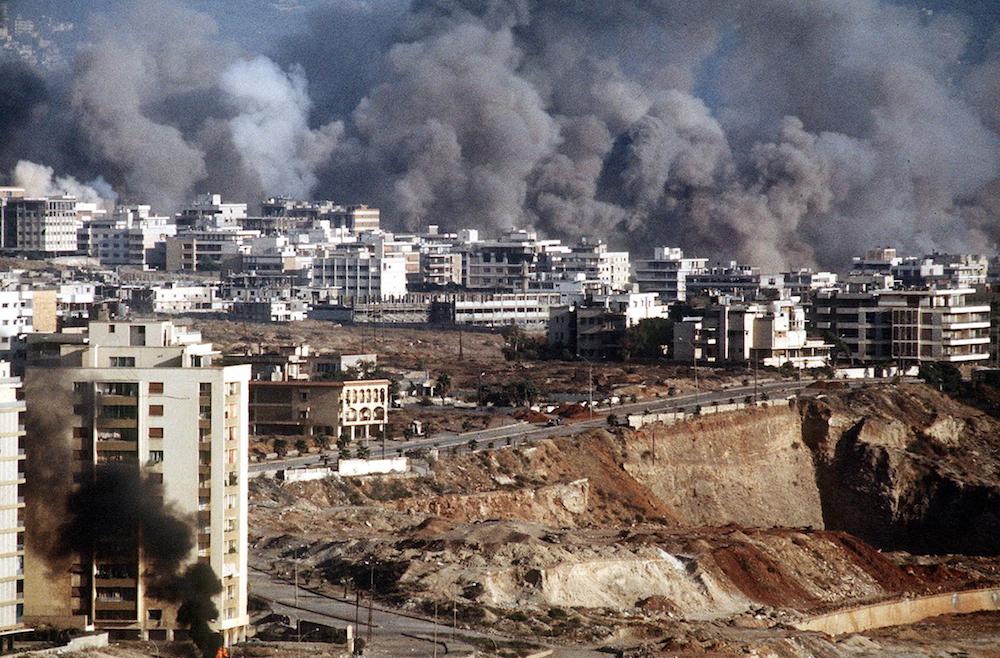
Picture dated August 2, 1982, shows Israeli shelling of west Beirut. (AFP/File Photo)
“You also had the Syrian hegemony in the country, and what did the Syrians do? They basically gave their wartime Lebanese political allies positions in the state.
“Before 75 you still had a Lebanese state. It had problems, but you had the state. Through the 1950s and 1960s, Presidents Camille Chamoun, Fouad Chehab and Charles Helou (all) had a statist approach: they strove to expand the power of the state and its institutions.
“At the end of the war, the state had been severely damaged. What the (Syrians) established instead was a system of sectarian pie-sharing. The state was given to sectarian wartime leaders, and they pillaged it throughout 40 years.”
Young added: “Another problem of the sectarian system today is it has become an excuse to block everything. Today, because there is no consensus, everything is blocked. We have a completely dysfunctional system.”
Behind the glitz of the proclamation ceremony of 1920, what the Christians really did was link their fate to another country: France. Reliance on outside forces turned out to be a pattern in Lebanese history that for decades continued to blight the country’s progress and fan the flames of rivalries within Lebanese factions.
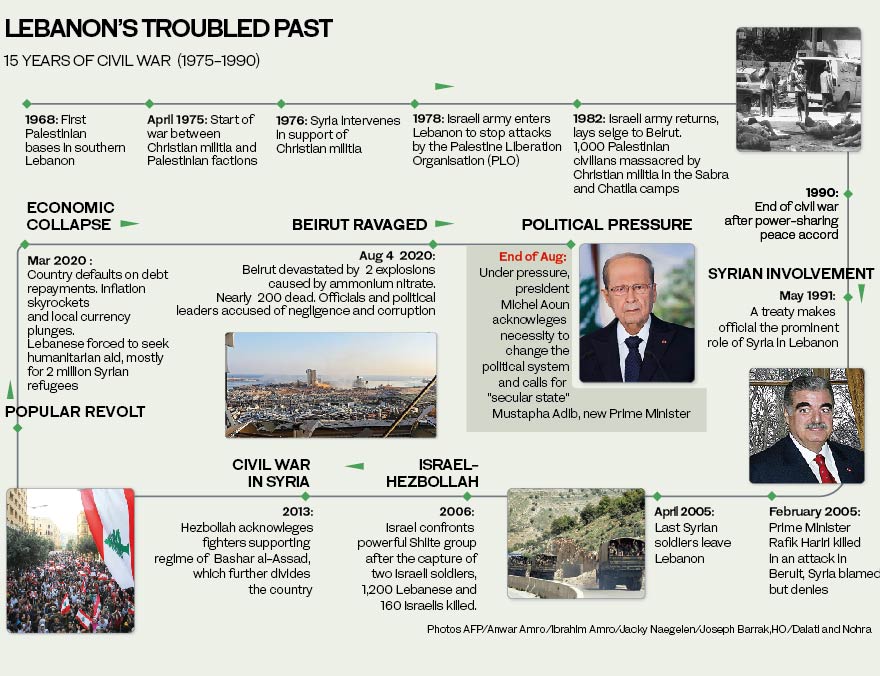
And so, in the aftermath of the 1967 defeat, when Lebanon received the Palestinians, part of the Lebanese population sided with Palestinian militancy. Similarly, in 1982, when Ariel Sharon entered Lebanon, the Maronites built an alliance with Israel, without any consensus reached with the other communities.
“All the Lebanese communities have ignored the rules of the sectarian game which demands and imposes modesty. No one here is modest,” said Young.
In his book, Young compares then-President Bachir Gemayel to Hezbollah leader Hassan Nasrallah: “Both of them reflect one of the fundamental problems of Lebanon: they had their own sectarian, communal agenda, and they expected they could impose it on the majority of the Lebanese.
“Since the end of the Israel-Hezbollah war in 2005, Hezbollah has been pushing the Iranian agenda in Lebanon and the region.
“Once again, we are at this inflection point where we can stabilize the situation, but one minority somehow wants to impose its vision on the others.
“When Hezbollah wants to intimate people, it will ultimately end in civil war because that is the nature of the system. Communities begin to respond when they feel threatened. And they ally with other communities that feel threatened as well.
“Today, we have a dominant military force called Hezbollah that is not allowing for the consolidation of a sovereign state. We’re coming back to the problem we had after 1967 of a state existing in parallel with an anti-state. This cannot last forever. Sooner or later one has to take over the other.
“Tensions will continue until this issue is resolved. And on top of it, Hezbollah is an armed group that is not loyal to Lebanon. It is loyal to a foreign power. And that is the problem.
“It is not because Hezbollah today has weapons and can intimidate people that it can impose its will on the majority. It cannot. That’s a simple fact.
“Even if there is a civil war in Lebanon now, Hezbollah may be the best armed, but I don’t think it would win the war. The game of intimidation does not work in a sectarian context. You have to respect the rules of the sectarian game.
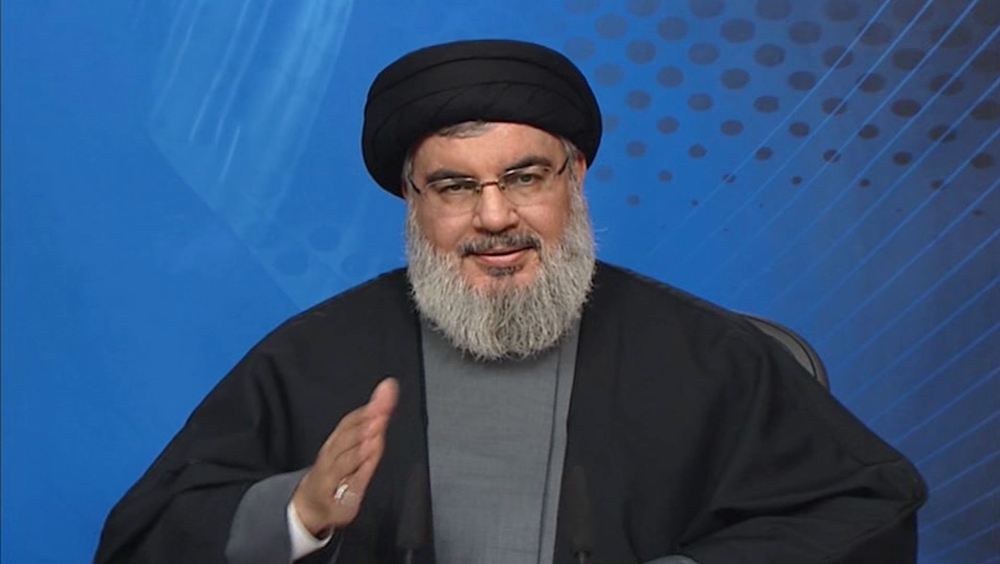
Hassan Nasrallah, the head of Shiite movement Hezbollah, giving a televised address from an undisclosed location in Lebanon. (AFP/Al-Manar/File Photo)
“Hezbollah is a Frankenstein created by many people. It was not only Iran, not only the contradictions in the Lebanese society, but believe it or not, after 1990 it was also created by all those who supported the Syrian order in Lebanon.
“Don’t tell this to the Americans. They don’t like to hear it, but they supported the Syrian order that reinforced Hezbollah and used it as an instrument in the Syrian-Israeli negotiations, at a time when the US had completely accepted and recognized Syria’s dominant role in the country.
“Hezbollah has many fathers.”
In conclusion, Young said: “We have no domestic agenda. Our agenda is always tied to someone outside of Lebanon. every community has been weakened by it. The Maronites lost power. The Sunnis lost power. Now Hezbollah and the Shia. We will see where they’re going.”
For his part, Zoghaib, the poet cried out “Mea culpa, mea culpa, mea culpa” for the all the mistakes he said he and his people had committed against their beloved country.
In his poet’s optimism, he quickly moved on to embrace hope. “This nation is filled with temples, Muslim and Christian. When in the heart of the capital, the Mohamed Al-Amine mosque embraces Saint George’s cathedral. That is the image of true Lebanon,” he told Arab News.
“What value do the cross and crescent have if we didn’t respect them, and honored the teachings of the Quran and the Bible? ‘In the Name of God, the most Gracious and Merficul’ and ‘In the Name of the Father, the Son, the Holy Spirit’ are two paths going upward to the same destination: God. Lebanon is really ‘Leb-Anon’ — ‘The heart of God.’”
-------------
Twitter: @EphremKossaify


